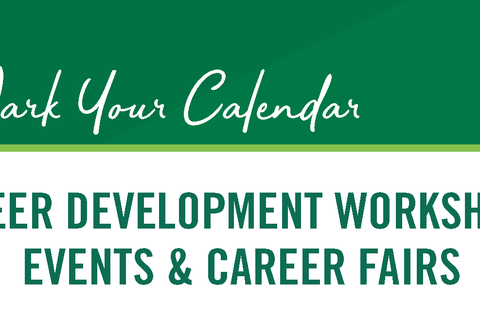What is Networking?
Networking is the art of building and maintaining mutually beneficial relationships.
During your college career and throughout your work life, you will have opportunities to attend professional and social events where guests “network.” Many people assume incorrectly that networking is only about finding jobs. While attending a networking event rarely lands you a job, it could help you create relationships that eventually leads to a job. If you make one valuable contact at a networking event, it’s worth the time you invested to attend.
People often expect an immediate pay-off from networking. However, creating meaningful, lasting connections with people takes time. Building a powerful network also requires you to help others as much as they help you. As you meet new contacts, listen for ways you can help them. Over time, your generosity will be rewarded. In this modern era, you have the added benefit of being able to use social media to also build and maintain your network.
- Increase your visibility by being seen at professional, social and community events
- Expand your pool of contacts
- Learn new things that can be helpful in your career
- Build your personal brand
- Gain access to powerful and influential individuals
- Expand your sphere of influence
- Increase your marketability
- Position yourself for new career opportunities
An elevator speech is a 30 second to 1 minute personal statement that provokes the person you are speaking with to want to learn more about you. It is a useful tool that you can use in any number of situations from networking events to voicemail messages to interview introductions.
Main Components
- I am (personal introduction)
- Name
- Graduating with a _____ degree in ____ from _____
- Looking for a position as a ____________
- My interests are (relevant to the listener’s needs)
- In the field of ______________
- Providing _____________ service
- I know about your organization (I have done my research)
- I’ve researched your company and learned ____
- You produce _____________
- You are a leader in ________
- You need _______ in your company
- My skills/accomplishments are (I can do what needs to be done)
- I excel at ________
- I can bring _________
- My previous supervisors have said I ______
- I produced _______
- I can deliver _________
- In my last position I accomplished _______
- I would like an interview/meeting/referral (I feel confident you will benefit from the meeting)
- You must make a request at the end of your speech
- e.g. Do you mind if I connect with you on LinkedIn? Email you?
- Don’t ask for a position or about benefits
- You want to discuss further:
- your skills
- the company
- a project
- obtain career advice
- a referral
An example of an Elevator Speech
“Hi, I’m Mary Smith. I’ll be graduating from USF in May with a bachelors degree in marketing and I have a real passion for the environment. I love creating outside-the-box marketing strategies for new products, especially environmentally-sensitive ones.
I understand that your company has produced some new green products that aren’t on the market yet. Last semester, while interning for a local firm I created an aggressive marketing campaign for a new product, which improved their sales.
I’d love to talk to you about how I might be able to use the skills I’ve learned to help your company. Are you available for a brief meeting on Monday or Tuesday?”
Do:
- Rewrite your speech in order to sharpen its focus.
- Make it sincere and provide a glimpse into your personality.
- Speak confidently and enthusiastically.
- Practice your speech until you’re comfortable with it from beginning to end.
- Maintain eye contact with your listener.
- Prepare different versions for different situations.
Don’t
- Use more words than necessary.
- Include industry jargon or acronyms.
- Rush breathlessly through it.
- Make a “canned” presentation.
- Tell your network that you are seeking a new position through your status updates. However, use caution if you are seeking a job from a current position.
- Stay active on LinkedIn. Post relevant updates that relate to your career path and participate in groups.
- Find out where people with your background are working and start connecting. You can do a search using your geographic area and keywords from your profession. You can also make use of the LinkedIn alumni tool. Simply go to >Network > Find Alumni.
Informational Interviewing
Informational interviewing is an effective method of collecting information on a career field from professionals currently in that industry. Informational interviewing will help you sharpen your perception of the career you are researching while assisting you in making more intentional and strategic career decisions, developing contacts in the field and industry, and measuring your compatibility with the people, environment, and culture of a specific. Do not confuse informational interviewing as a job-seeking method.
- Ask if the professional would be willing to meet with you to discuss their profession
- Briefly share your academic background, major/minor, and professional interests
- Arrange a mutually agreeable date, time, and location
- Be sure to give your phone number and email
- Obtain or clarify directions to the organization
- Inquire about parking instructions
- Ask about appropriate attire
What happens during the informational interview?
- Meet for 20–30 minutes in the office or designated location of the professional or by phone if they prefer
- Tour the organization (if appropriate)
- Ask relevant questions and listen to advice
- Maintain contact (if meeting in person)
- Expand your network by asking if there is anyone else with whom the professional would recommend that you connect
- Utilize the resources in the Center for Career and Professional Development to be informed about your career of interest
- Start with people that you are familiar with and practice
- Contact the professional well in advance to schedule
an appointment - Be prepared to respond to questions from contact
During - Dress appropriately and arrive 5-10 minutes early
- Refer to your list of questions if you need to; it
shows preparedness - Make positive first impressions through appearance, social skills, and punctuality
- Observe the work environment, people, dress, and culture
- Thank everyone for their time and assistance
- Ask for business cards and other contacts as appropriate
Follow-Up - Summarize information you gathered
- Send a written thank you note within 24 hours following the informational interview
- Keep contact informed if they expressed interest
- Contact new referral leads
- How did you get started in this industry?
- What is your educational background and what previous work experiences have you had?
- What short and long-term trends affect your industry?
- What are the positive aspects of your position and this industry?
- What are the major challenges you encounter on your job? How do you deal with them?
- What professional associations represent this industry?
- Is there another professional I should talk with about the career and trends in this field?
- What are some other good sources of information about this industry — articles, reports, journals, people?
- What are the current career opportunities in this field?
- What skills, experience or other qualifications are sought by employers in this field for entry-level employees?
- What is the typical career path for entry-level hires?
- What qualities, backgrounds or achievements did they have that made them attractive candidates?
- Is training typically formal or on-the job training?
- Can I contact you if I have further questions?
- Is there anyone else that you know who might also be willing to speak with me?











